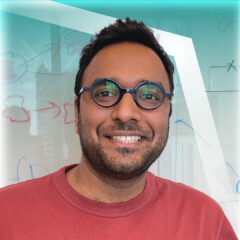This case study features in the Schmidt Science Fellows Annual Report 2020-2021.

Dr. Yogesh Goyal is a member of the inaugural cohort of Schmidt Science Fellows, selected in 2018. As a first-generation low-income student born and raised in rural Jammu and Kashmir, Yogesh studied for his undergraduate degree at to the Indian Institute of Technology Gandhinagar. Yogesh then moved to the US and completed his PhD at Princeton University in chemical and biological engineering. During his Fellowship Year, he pivoted his science into single-cell biology at the University of Pennsylvania. He is now an Assistant Professor at Northwestern University, jointly with the Department of Cell and Developmental Biology and the Center for Synthetic Biology.
Describe your journey from your Fellowship Year to your current role as Assistant Professor at Northwestern and how that came about?
My work as a Schmidt Science Fellow was a big pivot from my PhD in developmental biology to completely different systems and completely new types of questions in cancer and single-cell biology. It was a very challenging transition. I often questioned if this was the right choice, but now that I am starting my own lab, I am grateful for the knowledge and skills I have from two conceptually distinct areas.
Many of the projects in my own lab will be driven by both fields, which is only possible because I developed this ability and confidence to successfully switch disciplines and make connections across unrelated areas.
I view myself as an interdisciplinary scientist bringing my training in engineering and mathematics to study biological questions.
How did Schmidt Science Fellows help you progress after your Fellowship Year?
A unique aspect of the Fellowship is the one-on-one interactions that have continued since I became a Senior Fellow. Everybody throughout the Fellowship cares about my progress. When I began to receive job offers, both Keith Burnett and John Boothroyd worked with me to mentor me in the process of negotiation. They taught me how to strike a good deal and what to avoid, which helped me navigate difficult obstacles that postdocs are typically not trained to know in this highly competitive market.
If you could pick one aspect from your Fellowship Year you value most, what would it be?
Community. I have interacted with a lot of different people from my Fellowship Year. We are a growing community – it’s a very synergistic partnership where we look out for each other and provide feedback across the Fellowship.
Ryan Truby from the 2018 cohort is also an Assistant Professor at Northwestern, so I asked him and other biology folks within the Fellowship questions about job markets and moving to Chicago. To have a community where we can discuss not only science but share emotions and be vulnerable has helped me overcome further boundaries. I am grateful for meeting people from different foundations and universities, and this network would not have been possible if not for the Fellowship.
What skills and experiences have you gained from the Fellowship that you have now utilized in your scientific career?
How to manage people and how to understand what people want. I realize running a lab is more than just doing good science. All the diverse training during the Global Meetings taught me how different people think and approach their goals and incentives. As a leader, that is just as important as asking the right science questions because you must motivate people.
I have also particularly enjoyed the peer-mentor scheme where I have mentored current Fellows. As the name suggests, it creates a balance of being a peer and mentor to exceptional Fellows and getting to know how they think and how I can help them advance their journey in the Fellowship. That has been an enriching experience and will help me in my lab as I communicate with a wide variety of people.
What are your scientific ambitions now at Northwestern University?
I view myself as an interdisciplinary scientist bringing my training in engineering and mathematics to study biological questions. My lab will focus both on studying cancer drug resistance and on how we go from a single cell to a fully developed animal – importantly with a major goal to measure everything to have a more quantitative understanding of how these disparate biological processes work.
I care about running a group with people from all scientific backgrounds. I want to have a mix of biologists, physicists, engineers, mathematicians, and computer scientists who collaborate inside and outside of the lab to ensure a robust interdisciplinary approach to answer open problems in biology.